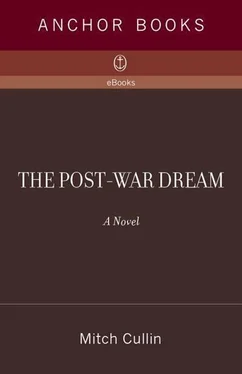“What do you mean?” he asked, with an uncomprehending expression.
“I'm saying cancer shouldn't get the last word, even though it's killing me.”
The living-room curtains were open, and suddenly Hollis's eyes shifted to the window where he saw the black of night softened by the bright transparent reflection of the living room.
“It isn't easy for you, I know,” she said. “It isn't fair either.”
“No,” he said, sounding irritated, “it isn't fair.” Our story wasn't supposed to go like this, he thought. This isn't how I wanted it to finish. He shook his head, biting his bottom lip, and continued staring at the window.
Debra sighed tiredly, squeezing his fingers, and said, “Hollis, you need to hear me. It's important what I'm about to say, so please listen.”
And now it was her turn to talk, although she wouldn't be revisiting their past; instead, she addressed the near future like an unapologetic fortune-teller prophesying the details of her own demise, revealing what she — and Hollis — could expect in the weeks ahead. Just that afternoon, while returning from the outpatient clinic in Tucson, she had decided not to pursue any more treatment, because it was obvious the disease hadn't stopped spreading even with the preventative use of chemotherapy agents or, for that matter, other experimental drugs. As such, the cancer cells would keep wrecking havoc, creating a bowel obstruction; there would be nausea and vomiting, an inability to pass gas, and her abdomen would swell in girth, surpassing the discomfort of the current ascites. At the end, whatever remained inside her would be expelled by traveling up the esophagus, moving through her throat and out between her lips as a dark greenish bilelike substance carrying the odor of feces — and her withered body, malnourished in appearance, would begin shutting down. Of course, drops of morphine would ease her through those final hours; she would exit this world within an incoherent fever dream, whispering unintelligibly and incessantly as if speaking in tongues, laboring for air while drifting to and from consciousness — until, with the transitory span of a second, she ceased breathing altogether.
Debra fell silent for a moment; her sunken face, lacking any makeup, seemed much older than it should have looked. Outside, Hollis couldn't see a thing — not the houses across the street, nor the stars above them. Then she said, without urgency, that they had to accept her death was fast approaching, but the last painful act wasn't yet a given; for a brief period remained in which she could trump the concluding onslaught of the disease. She could, with his support and permission, depart a bit prematurely, doing so on her own terms — by her own hand, in the tranquillity of their beautiful home — circumventing the indignity of what otherwise would be, for both of them, an excruciating, almost unbearable endgame.
Debra paused, hoping Hollis might now offer her something, but instead he shook his head with confusion, saying nothing. “Anyway,” she went on, “it's about over for me, except I don't want to waste away any more than I already have — and I don't plan on going through the worst of it — and if you won't help me go then, please, at least give me your blessing so I can do it alone with peace of mind. I want to be aware of myself and where I am at the conclusion of my life — I deserve that, after all, and so do you.”
Hollis felt a jolt deep inside himself when bringing his eyes to her. He felt a tightening in his chest. “Deb, I can't give you my blessing,” he said, his voice breaking, “but I can't say I'd blame you either — because I wouldn't.”
“I know you wouldn't,” she said, resting a hand against his neck. “So that's good enough for me. Thank you.”
His eyes began welling, and when he then tried to speak, the words he most wanted to say confounded him, becoming uttered in part through a stifling, gasping shortness of breath.
“Love you, too,” she responded, pressing dry lips against his chin as he leaned forward to kiss her forehead.
Hugging each other, they both wept for a little while — and afterward, they sat back without talking, the tears dripping off their faces, shaken by the irrevocability of the moment. Then Hollis rose from the couch and went to stand at the window. When Debra finally left the living room for bed, he was still there at the window, staring into the night — as if reluctantly awaiting the snow which would soon fall, somehow already sensing that frigid morning where everything around him would become transformed.
And so it was to be that snow, at dawn this morning, which beckoned Hollis and Lon forward while the Suburban's hazard lights blinked near the golf course — while the whole of Nine Springs conveyed a listless existence and fireplaces had begun to tinge the air with a woodsy autumnal flavor. The pair trudged straight across the deeply buried greens as a vision of red and cobalt — Hollis in his metallic-colored duvet jacket, Lon in his scarlet parka — going away from the place where Lon had slipped, both leaving a trail of footprints through a glaring, unbroken white expanse: neither speaking now as the sun reflected off the snow and washed out their sight, neither questioning their slow progression which fractured the pure white earth below a pure blue sky, neither asking why it was that they had felt the need to venture forward on the golf course instead of returning to the temperate comfort of their respective homes. Thick, visible exhalations of breath curled up in front of their rosy-cheeked faces like hot industrial steam, preceding them beside hidden sand traps and icy man-made ponds. Holding hands for support, walking side by side, the two men swallowed the cold and the wind, remaining mindful of each step crushing the snow, aware all the while that if one should suddenly fall the other was likely to get dragged down, too. Yet Hollis couldn't maneuver quite as deftly as Lon, for his left thigh ached somewhere below the scar while his feet had grown numb inside the leather boots. But pressing onward with an increasingly painful limp, Hollis was bolstered by a recollection he had been fortunate enough to have never experienced firsthand — those bitter winters during the Korean civil war, that subzero march southward from the Chosin, exposed skin bonding to metal and bloody palms stripped off by frozen mortar shells, frostbite blackening heels or toes. Then Hollis sensed his winter footwear was absorbing moisture; it seemed his socks were growing damp and squishing around within the boots, although the loss of feeling in his feet prevented him from knowing for sure.
It was Lon, however, who paused to catch a breath, shaking loose the snow caked on his galoshes before removing one of his black mitts. While Hollis blew into his bare hands and rubbed his palms together to generate heat, Lon held the mitt out for him, nodding once but saying nothing. Hollis accepted what was offered, working the wet mitt onto his left hand. Just then a crow's scream broke the morning calm, its harsh call echoing from where the bird circled far overhead and appeared to be monitoring them from up high. As if prompted by the ominous cawing, Lon resumed walking, seizing Hollis's bare hand in his own bare hand, tugging him along. The crow screamed a second time, its uneven circle moving and traveling with the pair.
Farther they went, past the eighteenth hole, farther still — the streets and homes now well behind them, the eastern section of the golf course having been designed to jut into undeveloped desert like an oasis — until reaching the edge of their known world, dead-ending at a chain-link fence where, ahead of them in that no-man's-land beyond Nine Springs, was a grove of orange trees, then sloping terrain, then the distant ranges of the Catalina Mountains. But what summoned them lacked reason; what drew them to the fringes was only revealed when at last beheld, and in its august presence they stood dumbstruck at the fence: a lone Hereford cow was waiting on the other side, standing several yards away beside an orange tree, as if sanctuary from the snowstorm had been sought below the branches — a solitary brown-and-white cow which had seemingly anticipated their approach, facing them with eyes agape, glistening while long pendants of ice dripped from its huge nostrils and underside, staying erect but releasing no breath — lifeless there yet frozen upright in tableau.
Читать дальше










![Theresa Cheung - The Dream Dictionary from A to Z [Revised edition] - The Ultimate A–Z to Interpret the Secrets of Your Dreams](/books/692092/theresa-cheung-the-dream-dictionary-from-a-to-z-r-thumb.webp)

